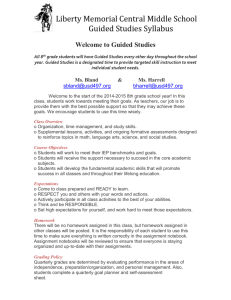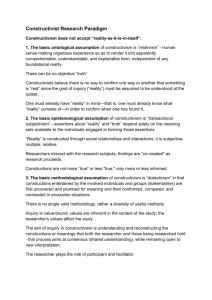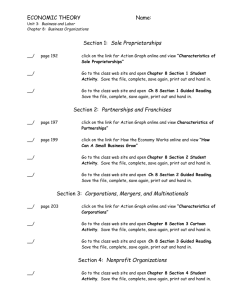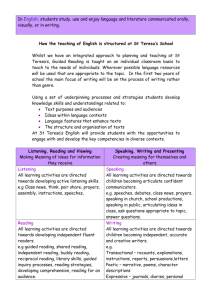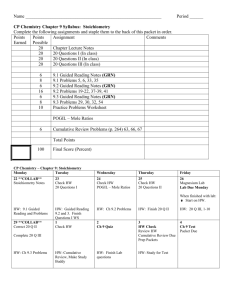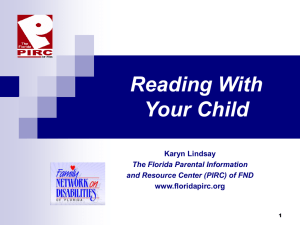Oriented Guided Inquiry Learning
advertisement
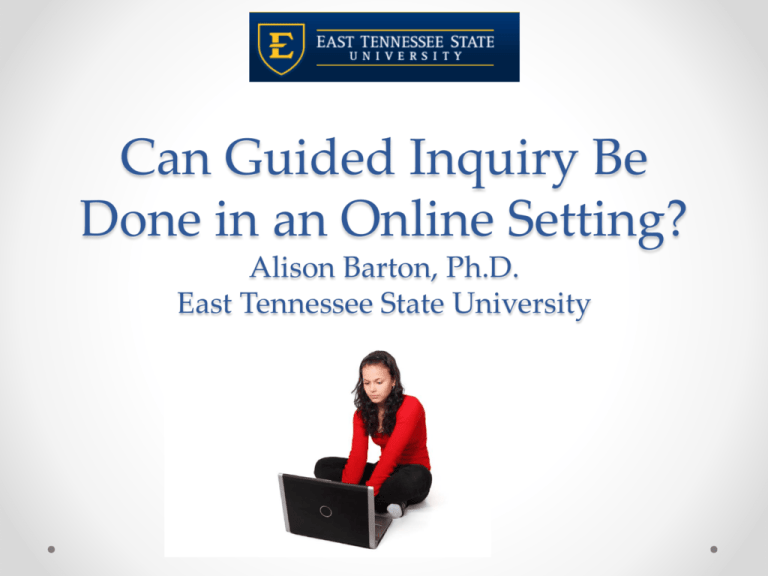
Can Guided Inquiry Be Done in an Online Setting? Alison Barton, Ph.D. East Tennessee State University POGIL Process-Oriented Guided Inquiry Learning POGIL! • Groups of 3-5 • Manager: Reads questions aloud, keeps group on track • Spokesperson: Shares out • Recorder • Consensus-Builder • Information-Seeker Model 1: October Sky Go to this source link: https://www.youtube.com/watch?v=cP_OM5VVcSo 1. What were the boys in this clip learning? 2. How did they gain their knowledge? 3. Can learning like this [in this manner] happen in the classroom? Why/why not? Model 2: Constructivism Definition J. Piaget, founder of Constructivism Constructivism “Constructivism is a philosophy of learning founded on the premise that, by reflecting on our experiences, we construct our own understanding of the world we live in. Each of us generates our own “rules” and “mental models,” which we use to make sense of our experiences. Learning, therefore, is simply the process of adjusting our mental models to accommodate new experiences.” - http://www.funderstanding.com/theory/constructivism/ 4. How is this definition similar to your answer to #2 above? Are there any differences? Atkinson-Shiffrin Model of Information Processing Model 3: Information Processing & Deep vs. Shallow Processing Levels-of-Processing Theory “When information is processed, it can be processed at varying levels of depth. Deep processing refers to fully analyzing information in terms of its meaning and importance. Shallow processing refers to processing information only in terms of its surface structure (sound, letters, etc.).” - http://www.uark.edu/misc/lampinen/LOP.html 5. Read the information in Model 3. What is the difference between shallow and deep processing? 6. If you were asked to fill in a blank model of the Atkinson-Shiffron model (presented as an overhead), would it be shallow or deep processing? Why? 7. If you were to add “deep processing” to the A-S model, where would you place it? 8. What are the 5 Es of the 5-E model? In your own words, what do they mean? 9. Could some of these occur out of order? 10.Go back to numbers 1-10 of this activity and identify which E they seem to reflect. (It is possible each question reflects more than one E.) You have just been through a guided inquiry. Guided inquiries follow the 5-E model of learning. 11.Can guided inquiries similar to this be done online? What would be similarities? Differences? Obstacles? Guided Inquiry #2: Educational Psychology https://elearn.etsu.edu/ 12.Do the general principles of constructivism (Model 2) support the use of an online guided inquiry? Explain. 13.Do the general principles of information processing (Model 3) support the use of an online guided inquiry? Explain. 14.Using our experience today as well as the sample online Guided Inquiry as guides, what can be used as a “model” as you craft a guided inquiry for your students? Resources & Recommended Readings Brown, P.J.P. (2010). Process-oriented guided-inquiry learning in an introductory anatomy and physiology course with a diverse student population. Advances in Physiology Education, 34, 150155. Eberlein, T., Kampmeier, J., Minderhout, V., Moog, R. S., Platt, T., Varma-Nelson, P., & White, H. B. 92008). Pedagogies of engagement in science: A comparison of PBL, POGIL, and PLTL. Biochemical and Molecular Biology Education, 36, 262-273. Lawson, A.E. (1989). Theory of instruction: Using the learning cycle to teach science concepts and thinking skills. NARST Monograph, Number One. National Association for Research in Science Teaching, Department of Science Education, College of Education, University of Cincinnati, Cincinnati, OH 45221. Maloney, J. F., & Oakley, B. II. (2010). Scaling online education: Increasing access to higher education. Journal of Asynchronous Learning Networks, 14, 55-70. Marek, E. A. (2008). Why the learning cycle? Journal of Elementary Science Education, 20, 63-69. Niederberger, S. (2009). Incorporating young adult literature into the 5E learning cycle. Middle School Journal, 40, 25-33. Robinson, C. C., & Hullinger, H. (2008). New benchmarks in higher education: Student engagement in online learning. Journal of Education for Business, 84, 101-109. Willingham, D. T. (2009). Why don’t students like school? A cognitive scientist answers questions about how the mind works and what it means for the classroom. San Francisco, CA: JosseyBass.

